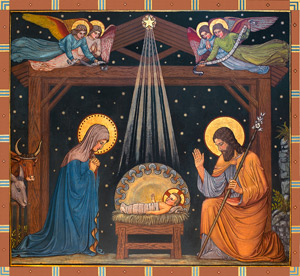“Our Faith” is a special Year of Faith feature that seeks to clarify often misunderstood Catholic teachings.

Judging by the numerous bumper stickers, billboards and signs at sporting events, John 3:16 is arguably one of the most quoted Bible verses in Scripture:
“For God so loved the world that He gave His only Son, so that everyone who believes in Him might not perish but might have eternal life.”
The Incarnation, the Son of God becoming man, is one of the central mysteries of our faith. Incarnate means to take on flesh.
By the Incarnation, it is meant that the Son of God, retaining His divine nature, took a human nature of a body and soul like ours. Jesus, the Son of God, the second person of the Trinity, became human.
The Incarnation is a result of an incomprehensible love God has for each and every one of us, and we recite this belief when we pray the Nicene Creed: “and by the Holy Spirit was incarnate of the Virgin Mary, and became man.”
The creed is not a list of ideas, but a summary of our faith that has been handed down through the centuries, beginning with the Apostles.
Fr. Doug Lorig, pastor of St. Maria Goretti Parish in Scottsdale, said the Incarnation of Jesus had its beginning with the fall of man.
“They severed their conversation with God by not being repentant,” he said. “Jesus didn’t simply come just to die on the cross — that wasn’t the focus. The focus was to restart the conversation with the Father that Adam and Eve ended.”
Jesus came to tell humanity that God loves us, especially the sinners. One parable that focuses on this deep, abiding love is the Prodigal Son.
“This is the true image, an icon, for the love that God has for His children,” Fr. Lorig said. “As part of His own creation, He didn’t descend on us in a flash of light as an eternal God. He came very, very small and that was the appeal to love. Love is the key to all of it.”
Catechesis of the Good Shepherd, a Montessori-based approach to the religious formation of young children rooted in sacred Scripture and liturgy, teaches the youngest hearts how to adore God.
Through the profound gesture of genuflection, children learn what it means to make themselves very small before God.
“When we kneel at the crèche, we make ourselves small enough to be with Him,” Fr. Lorig said. “God is not impressed with size or loud sounds, but with the smallness of the heart that knows how to love.”
Unlike our birth, Jesus enters into not only the womb of Mary, but the womb of the entire creation of God so as to make it whole.
Ryan Hanning, director of parish leadership support for the Phoenix Diocese, said next to knowledge of the Trinity, the Incarnation is an essential aspect of the basic Christian kerygma, or proclamation, “that God so loved the world” He entered into His creation to save us from sin.
Hanning said people often underestimate how essential the teaching is. The Catechism reminds us, “Belief in the true Incarnation of the Son of God is the distinctive sign of Christian faith.” (§463).
Hanning said some of the earliest heresies were fought over the nature of Christ — that He was both true God, and true man.
The Arians thought that He wasn’t completely God, while others taught that He wasn’t completely man, i.e., monophysitism.
“Today we can run this risk by falling into error by forgetting that Jesus was true God, in which we domesticate Him into just a good teacher among many, or forgetting that Jesus was true man, in which we don’t think Jesus can understand our temptations or brokenness,” Hanning said.
Jesus Christ is God because He is the only Son of God, having the same divine nature as his Father. Jesus Christ is man because He is the Son of the Blessed Virgin Mary and has a body and soul like ours.
“The One who becomes created in order to start a conversation with God loves us unto the end,” Fr. Lorig said. “Jesus didn’t walk away from death. The Father honored that and received His blood for the sins of the world — all out of love.”
Sr. John-Mark Maria of the Poor Clare Sisters of Perpetual Adoration in Tonopah explained that in our humanity we participate in God’s love by accepting and giving love to those around us.
“His love for us was so great that He shares Himself, as He knows we know, through the gift of self to the other,” Sr. John-Mark said.
There are many Scripture passages written about the Incarnation, 1 John 1:1-3 and 1 Timothy 3:16, for example.
Galatians 4:4-5 says, “But when the fullness of time had come, God sent His Son, born of a woman, born under the law, in order to redeem those who were under the law, so that we might receive adoption as children.”
The Incarnation truly is a mystery, and it’s one that Sr. John-Mark says parents need to pass on to their children.
“Believe in it, hope in it, trust in it, and let it permeate our actions, thoughts, and decisions of everyday life,” she said.
Gina Keating, a regular contributor to The Catholic Sun, leads children’s faith formation sacramental preparation at St. Theresa Parish.






